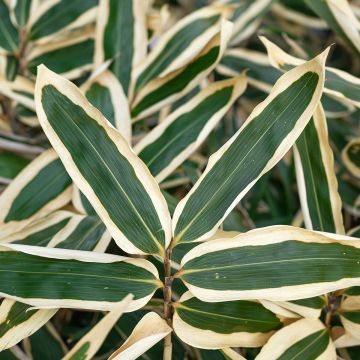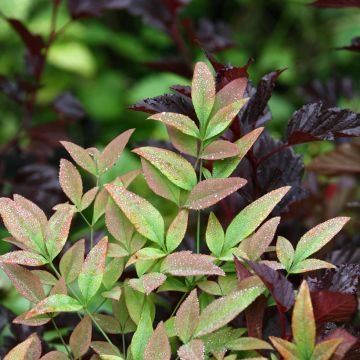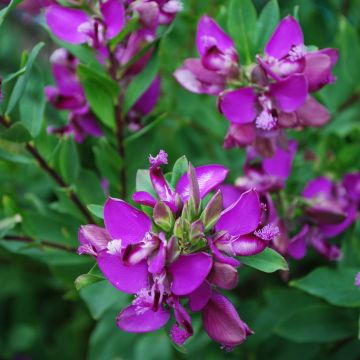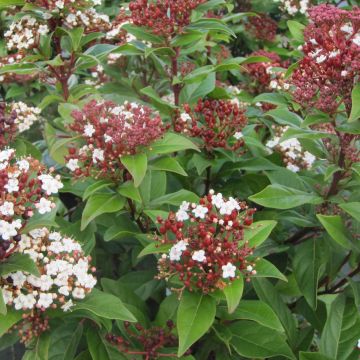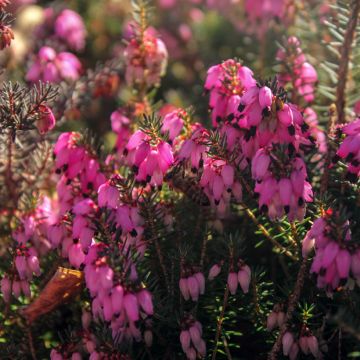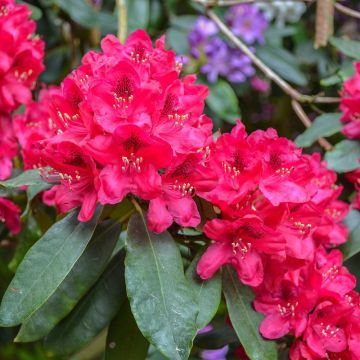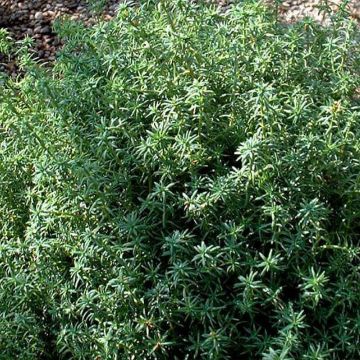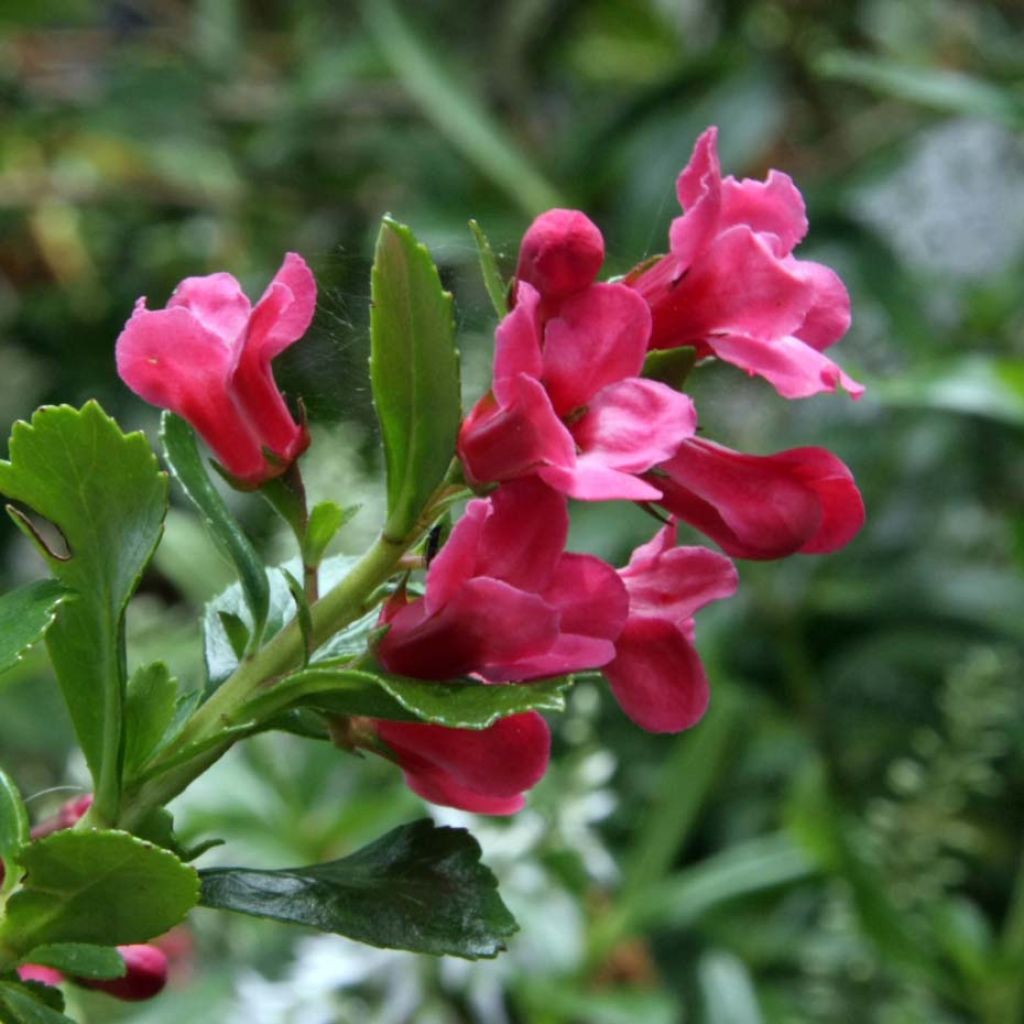

Escallonia virgata Pride of Donard
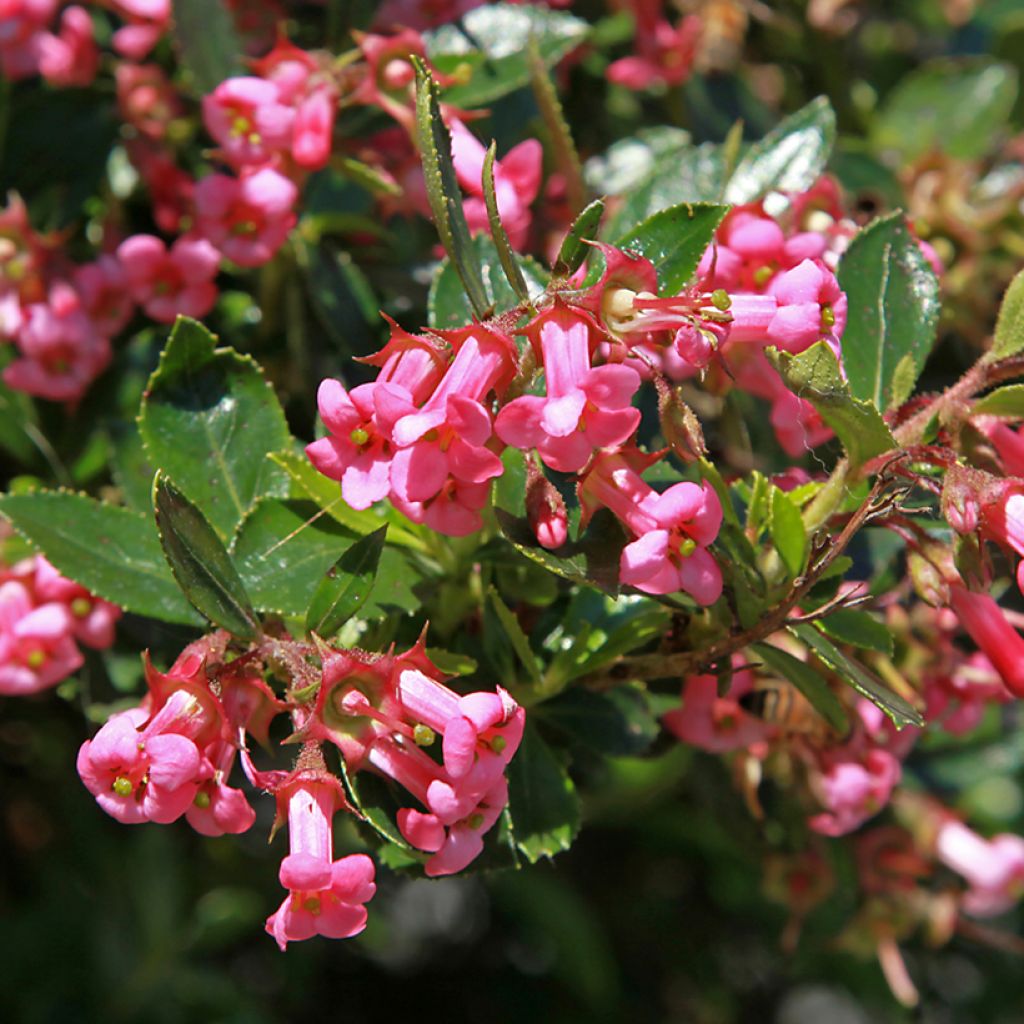

Escallonia virgata Pride of Donard
Escallonia virgata Pride of Donard
Escallonia virgata Pride of Donard
Redclaws
While unpacking my Escallonia, I noticed that a rod, used to secure the plant in the box, was stuck at the intersection of the first branch and the trunk. I had to cut this branch, which was hanging by a thread and unfortunately, was very well developed. Now, this Escallonia is no longer balanced. It is very clear that a branch is missing at its base.
Jojo, 03/03/2025
Special offer!
Receive a €20 voucher for any order over €90 (excluding delivery costs, credit notes, and plastic-free options)!
1- Add your favorite plants to your cart.
2- Once you have reached €90, confirm your order (you can even choose the delivery date!).
3- As soon as your order is shipped, you will receive an email containing your voucher code, valid for 3 months (90 days).
Your voucher is unique and can only be used once, for any order with a minimum value of €20, excluding delivery costs.
Can be combined with other current offers, non-divisible and non-refundable.
Home or relay delivery (depending on size and destination)
Schedule delivery date,
and select date in basket
This plant carries a 24 months recovery warranty
More information
We guarantee the quality of our plants for a full growing cycle, and will replace at our expense any plant that fails to recover under normal climatic and planting conditions.


Would this plant suit my garden?
Set up your Plantfit profile →
Description
The 'Pride of Donard' Escallonia is a vigorous evergreen bush with a rounded, compact and erect habit, essential in mild climates and coastal areas, whether in the ground or in containers. Adorned with beautiful glossy green foliage, this excellent flowering hedge subject is beautiful all year round. It offers a long summer flowering in the form of small bright pink-red flowers gathered in clusters at the ends of the branches. Like many escallonias, it loves the sun, tolerates shade (in hot climates), sea spray, limestone soils and summer drought once well established. This variety, award-winning in England, only dislikes heavy frost. If your climate allows it, plant Escallonia, these rewarding bushes grow fast, are floriferous, often fragrant and really undemanding!
The 'Pride of Donard' Escallonia is a horticultural creation born in Northern Ireland, at the Slieve Donard nursery, where many hybrids such as 'Donard Beauty' or 'Donard Seedling' have been developed, all excellent garden plants in mild climates. Escallonias belong to the Escalloniaceae family and are native to temperate areas of South America and Chile. In nature, these bushes grow among the thickets that cover the slopes or on coasts exposed to sea spray. Escallonia virgata, ancestor of the 'Pride of Donard' selection, is a compact bush with white flowers native to Chile and Argentina.
The 'Pride of Donard' variety forms a branching shrub with a bushy and erect habit, of fairly rapid growth, which will reach an average height of 1.5 metres (4 feet 11 inches) at maturity and a spread of 1.25 metres (4 feet 1 inch). It stands out for its evergreen leaves which are slightly larger than those of other varieties, leathery, alternate, ovate, with toothed edges, and shiny medium green. They are densely arranged towards the ends of the branches. Flowering takes place between June and August, for about two months, earlier or later depending on the climate, sometimes as early as May in hot climates. At the end of each branch, a cluster of 3 to 10 cm (1.2 to 3.9 in) is formed, composed of small five-petal, tubular bell-shaped flowers, bright pink with a white throat, enclosed at the base in a red and green calyx.
Escallonias are a great replacement for Weigelas in mild climates and coastal areas, as well as in dry gardens. 'Pride of Donard' is an excellent contrast and enhancement bush for white or red roses, and only dislikes icy winds and harsh winters. Well known to Breton, Irish or English gardeners, it is also comfortable in Mediterranean climates, after careful planting and regular watering for the first two or three years. It is tolerant of heat, dry summers once established, and limestone soils, and manages to flower in scorching or shaded situations. It is essential in coastal gardens: its flowering, like that of Olearias, brightens up the grey foliage of Atriplex, Bupleurum fruticosum, or Correa alba rosea. In a large group, it can be associated with cistus, Polygala, Grevillea (in neutral to acid soil), or spring-flowering shrubs such as lilacs, brooms, Kolkwitzia amabilis or buddleias.
Report an error about the product description
Escallonia virgata Pride of Donard in pictures
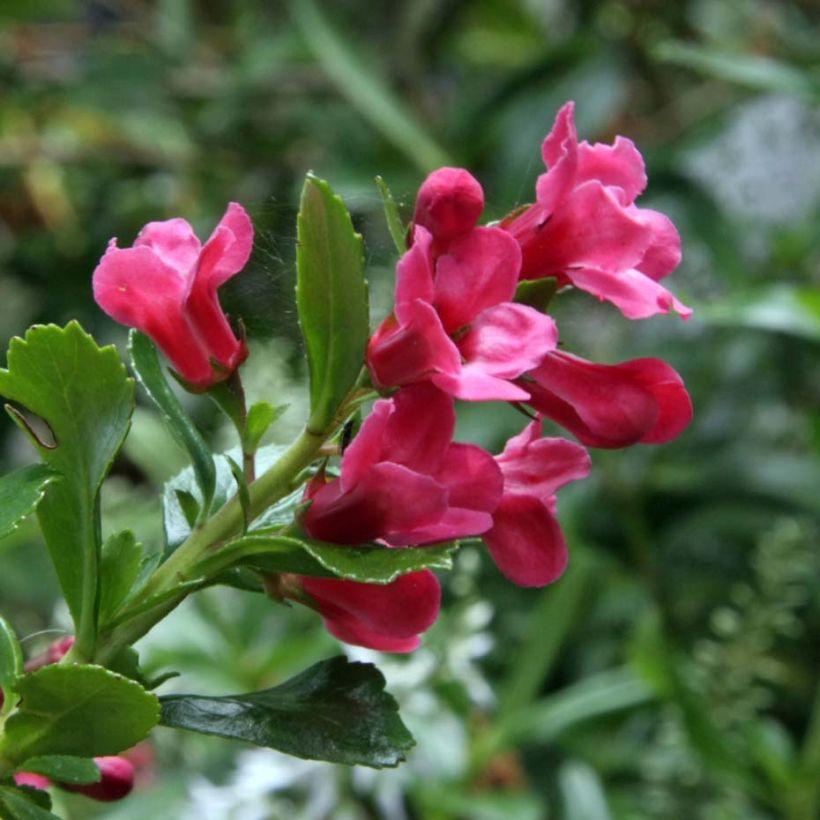

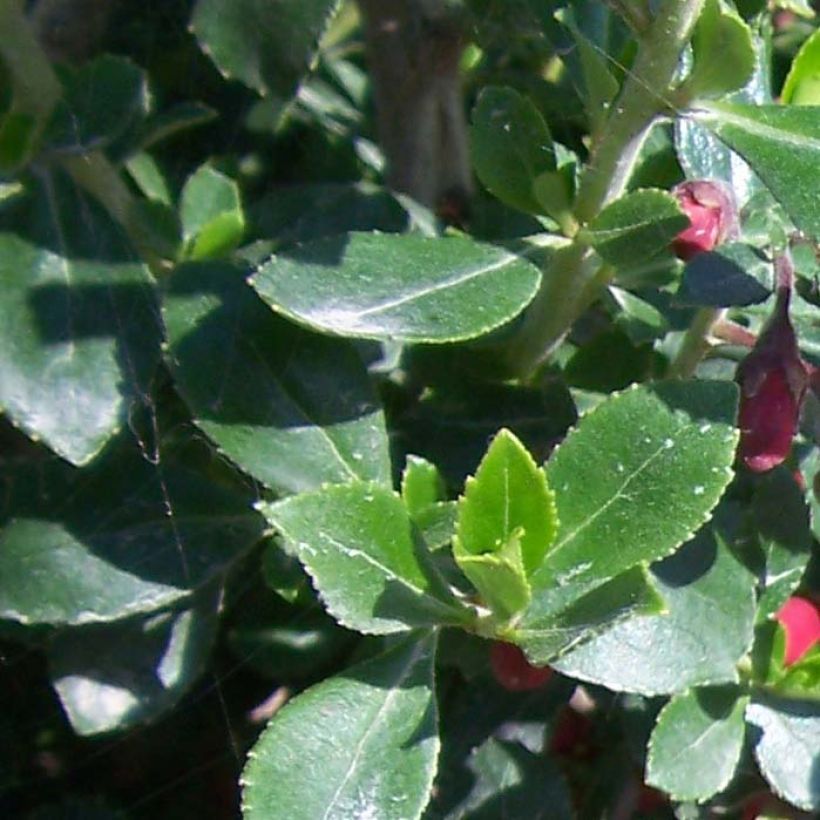

Plant habit
Flowering
Foliage
Botanical data
Escallonia
virgata
Pride of Donard
Escalloniaceae
Redclaws
Cultivar or hybrid
Planting and care
The 'Pride of Donard' Escallonia is best planted in spring or autumn in mild climates. It requires well-drained, light, fresh, slightly acidic, neutral, or even lime-rich soil, in a sheltered and warm location. It blooms more abundantly in the sun but tolerates shady exposures well. Once well established, it requires no watering in summer, even in dry climates. It can withstand sea spray but not cold winter winds. You can apply a rose fertilizer in spring if your soil is very poor. Prune to balance the silhouette in February and September. It dislikes heavy soils and stagnant moisture, especially in winter. If the soil is too heavy and lime-rich, it may suffer from chlorosis; if that is the case, apply a dose of sequestrene every year in spring. Prune back one-third of the height during the first few years so that the bush acquires a dense and compact habit. You can also prune it into a ball shape. In regions at the limit of hardiness zones, plant it in a location protected from prevailing winds, south-facing against a wall or west-facing in the back of a flower bed or hedge, and mulch the base in winter. If your escallonia freezes in winter, it is likely to regrow from the base in spring. Everywhere else, you can cultivate it in a container to overwinter in a bright location, protected from severe frost, remembering to water it occasionally.
Planting period
Intended location
Care
-
, onOrder confirmed
Reply from on Promesse de fleurs
Similar products
Haven't found what you were looking for?
Hardiness is the lowest winter temperature a plant can endure without suffering serious damage or even dying. However, hardiness is affected by location (a sheltered area, such as a patio), protection (winter cover) and soil type (hardiness is improved by well-drained soil).

Photo Sharing Terms & Conditions
In order to encourage gardeners to interact and share their experiences, Promesse de fleurs offers various media enabling content to be uploaded onto its Site - in particular via the ‘Photo sharing’ module.
The User agrees to refrain from:
- Posting any content that is illegal, prejudicial, insulting, racist, inciteful to hatred, revisionist, contrary to public decency, that infringes on privacy or on the privacy rights of third parties, in particular the publicity rights of persons and goods, intellectual property rights, or the right to privacy.
- Submitting content on behalf of a third party;
- Impersonate the identity of a third party and/or publish any personal information about a third party;
In general, the User undertakes to refrain from any unethical behaviour.
All Content (in particular text, comments, files, images, photos, videos, creative works, etc.), which may be subject to property or intellectual property rights, image or other private rights, shall remain the property of the User, subject to the limited rights granted by the terms of the licence granted by Promesse de fleurs as stated below. Users are at liberty to publish or not to publish such Content on the Site, notably via the ‘Photo Sharing’ facility, and accept that this Content shall be made public and freely accessible, notably on the Internet.
Users further acknowledge, undertake to have ,and guarantee that they hold all necessary rights and permissions to publish such material on the Site, in particular with regard to the legislation in force pertaining to any privacy, property, intellectual property, image, or contractual rights, or rights of any other nature. By publishing such Content on the Site, Users acknowledge accepting full liability as publishers of the Content within the meaning of the law, and grant Promesse de fleurs, free of charge, an inclusive, worldwide licence for the said Content for the entire duration of its publication, including all reproduction, representation, up/downloading, displaying, performing, transmission, and storage rights.
Users also grant permission for their name to be linked to the Content and accept that this link may not always be made available.
By engaging in posting material, Users consent to their Content becoming automatically accessible on the Internet, in particular on other sites and/or blogs and/or web pages of the Promesse de fleurs site, including in particular social pages and the Promesse de fleurs catalogue.
Users may secure the removal of entrusted content free of charge by issuing a simple request via our contact form.
The flowering period indicated on our website applies to countries and regions located in USDA zone 8 (France, the United Kingdom, Ireland, the Netherlands, etc.)
It will vary according to where you live:
- In zones 9 to 10 (Italy, Spain, Greece, etc.), flowering will occur about 2 to 4 weeks earlier.
- In zones 6 to 7 (Germany, Poland, Slovenia, and lower mountainous regions), flowering will be delayed by 2 to 3 weeks.
- In zone 5 (Central Europe, Scandinavia), blooming will be delayed by 3 to 5 weeks.
In temperate climates, pruning of spring-flowering shrubs (forsythia, spireas, etc.) should be done just after flowering.
Pruning of summer-flowering shrubs (Indian Lilac, Perovskia, etc.) can be done in winter or spring.
In cold regions as well as with frost-sensitive plants, avoid pruning too early when severe frosts may still occur.
The planting period indicated on our website applies to countries and regions located in USDA zone 8 (France, United Kingdom, Ireland, Netherlands).
It will vary according to where you live:
- In Mediterranean zones (Marseille, Madrid, Milan, etc.), autumn and winter are the best planting periods.
- In continental zones (Strasbourg, Munich, Vienna, etc.), delay planting by 2 to 3 weeks in spring and bring it forward by 2 to 4 weeks in autumn.
- In mountainous regions (the Alps, Pyrenees, Carpathians, etc.), it is best to plant in late spring (May-June) or late summer (August-September).
The harvesting period indicated on our website applies to countries and regions in USDA zone 8 (France, England, Ireland, the Netherlands).
In colder areas (Scandinavia, Poland, Austria...) fruit and vegetable harvests are likely to be delayed by 3-4 weeks.
In warmer areas (Italy, Spain, Greece, etc.), harvesting will probably take place earlier, depending on weather conditions.
The sowing periods indicated on our website apply to countries and regions within USDA Zone 8 (France, UK, Ireland, Netherlands).
In colder areas (Scandinavia, Poland, Austria...), delay any outdoor sowing by 3-4 weeks, or sow under glass.
In warmer climes (Italy, Spain, Greece, etc.), bring outdoor sowing forward by a few weeks.































